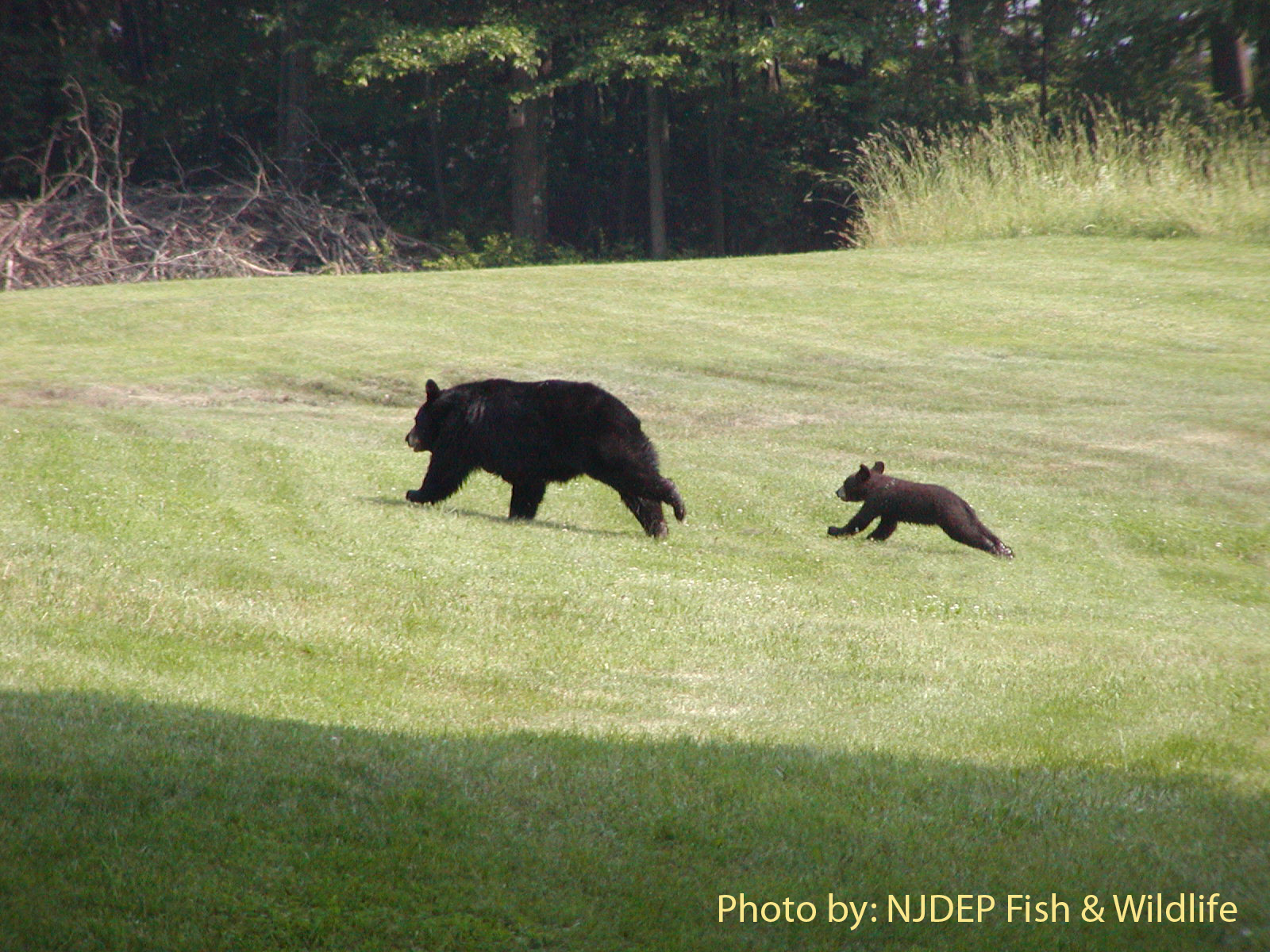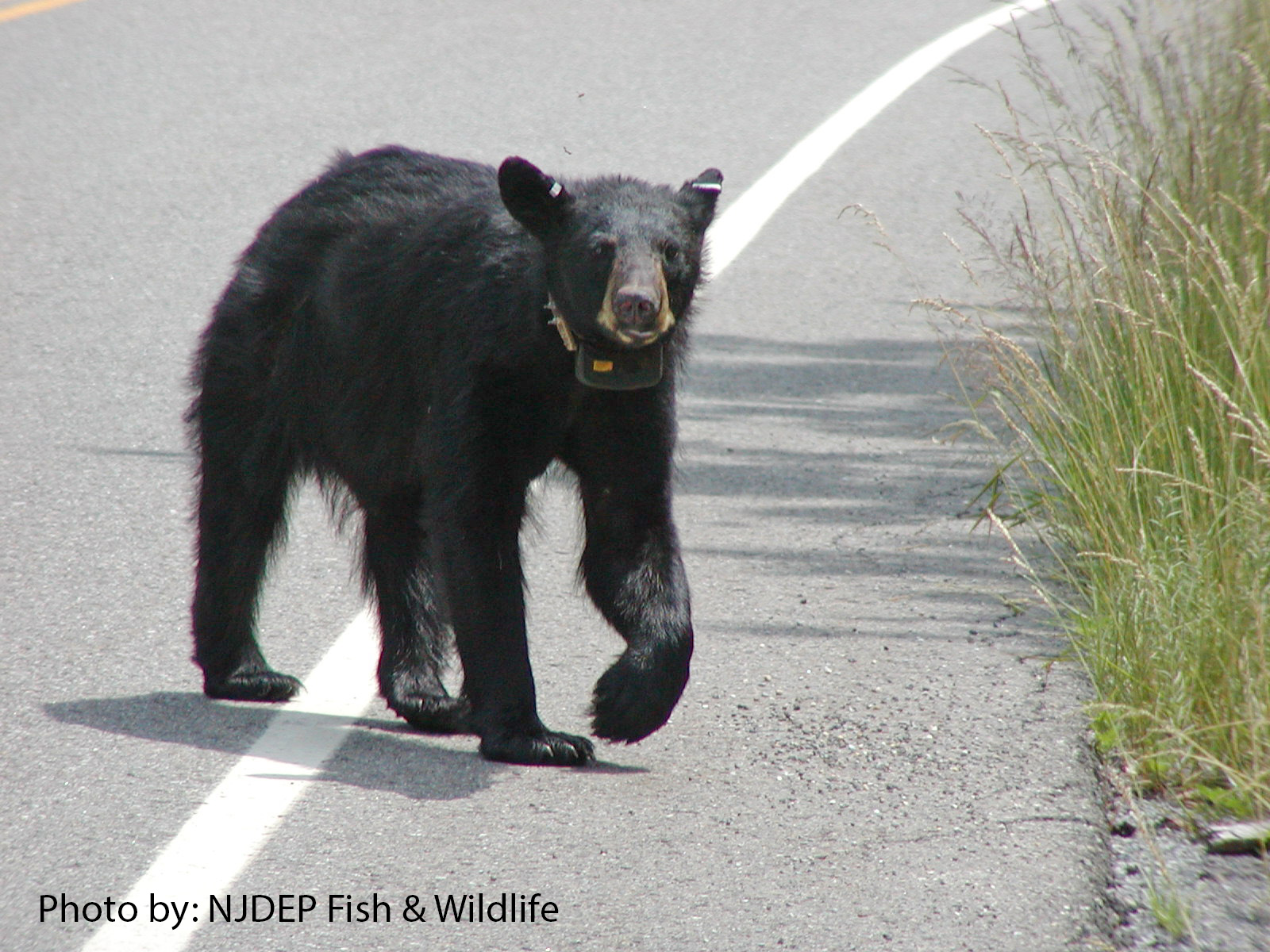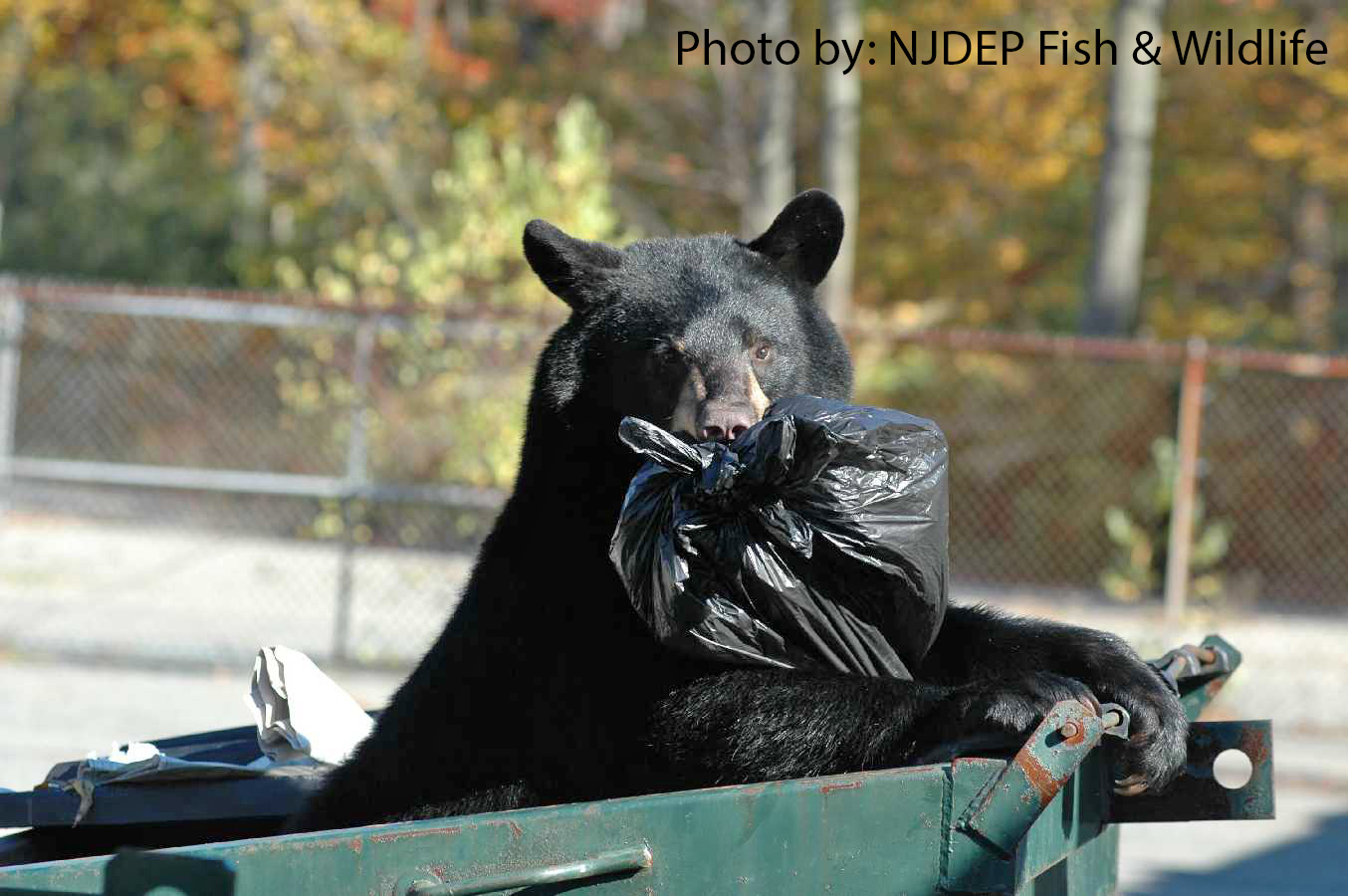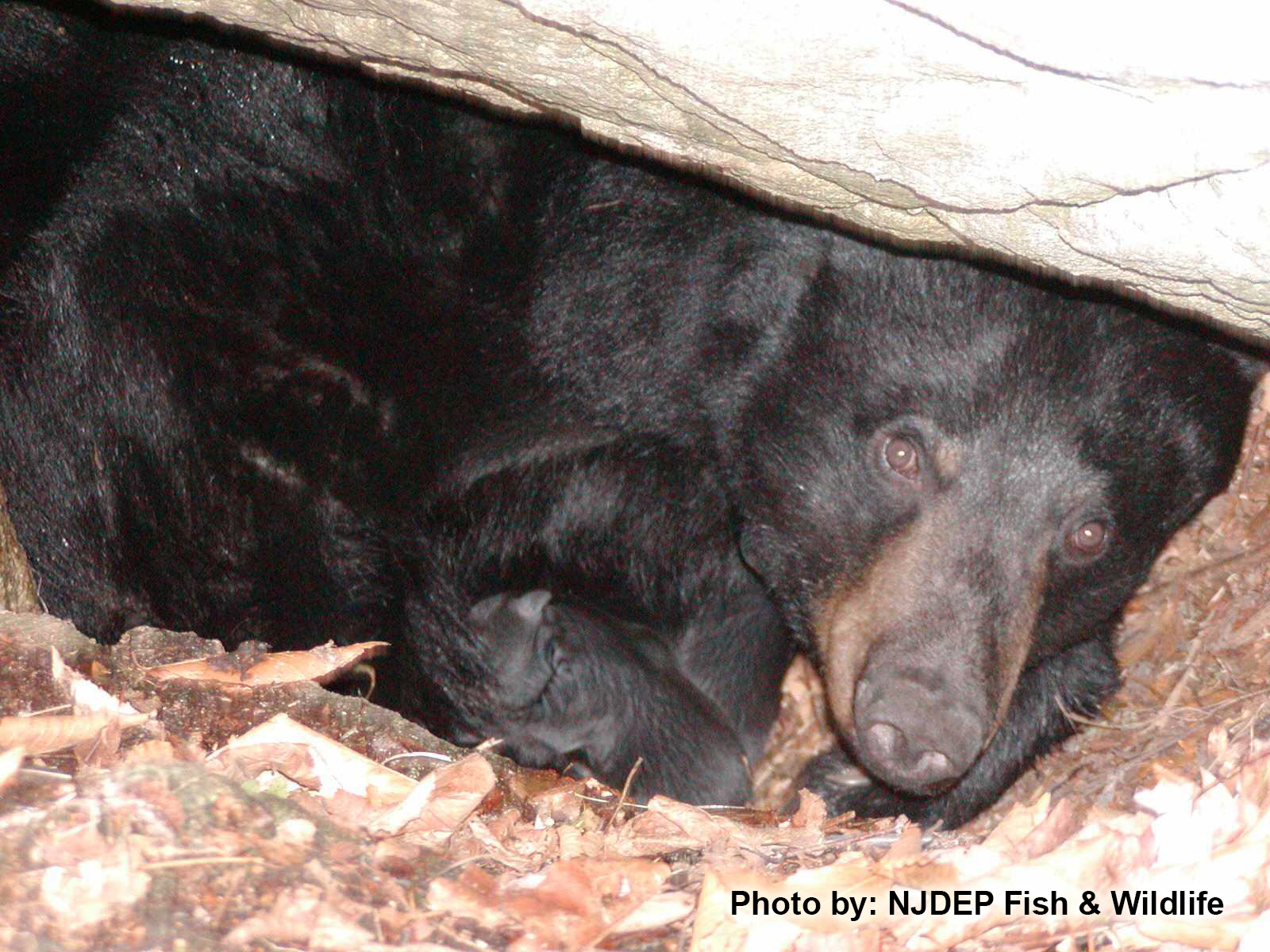Post content to your municipality’s social media pages during peak bear activity periods.
Tag us on Instagram and Facebook: @newjerseyfishandwildlife
SPRING
As the weather warms, black bears are emerging from their winter dens and actively searching for food. New Jersey Fish & Wildlife reminds the public to adhere to the following guidelines for removing potential food sources and avoiding interactions with black bears:
- Never feed bears. It is illegal and carries a fine of up to $1,000.
- If possible, use a certified bear-resistant garbage can. Otherwise, store all garbage containers with tight-fitting lids and place them within a secure location where bears are unlikely to see or smell them, such as the inside wall of your garage, in the basement, a sturdy shed or other secure area.
- Wash garbage containers frequently with a disinfectant solution to eliminate odors.
- Put out garbage on the morning of collection, not the night before.
- Avoid feeding birds when bears are active. If you choose to feed birds, do so only during daylight hours when bears are least active from December 1 to April 1. Suspend the feeder from a free-hanging wire, at least 10 ft off the ground and 10 ft from the trunk of a tree. Clean up spilled seeds and shells daily.
- Immediately remove all uneaten food and food bowls used by pets fed outdoors.
- Clean outdoor grills and utensils to remove food grease and residue. Store grills securely.
- Do not place any meat, dairy or sweet foods in compost piles.
- Remove fruit or nuts that fall from trees in your yard.
- Properly install electric fencing to protect crops, beehives and livestock.
Report black bear damage or aggressive bears to the local police department or to NJ Fish & Wildlife by calling 1 (877) WARN DEP (1-877-927-6337).
For more information about living with New Jersey’s black bears, including what to do in case of a bear encounter, visit https://njdepwptest.net/njfw/bears/.
Don’t Feed Bears – Spring Alert
Bears are emerging from their winter dens and searching for food. Don’t feed bears. Be sure to secure attractants on your property, such as garbage, birdseed, pet food, BBQ grills, and livestock. For more information about preventing bear encounters, visit njdepwptest.net/njfw/bears/.
To report black bear damage or nuisance behavior, call the police and NJDEP Fish & Wildlife at 1(877) WARN DEP (1-877-927-6337).
Secure Your Trash
Black bears are emerging from their dens and searching for food. Avoid attracting bears by following these garbage management tips:
- Ensure that your garbage is secured in a certified bear resistant garbage can or in a sturdy enclosure (like a shed, garbage, or bear resistant-dumpster enclosure).
- Put out garbage on the morning of collection day, not the night before.
- Wash trash containers with a disinfectant solution weekly to eliminate odors.
- Secure and clean recycling containers. Empty recyclables, like food cans and bottles, can attract bears.
For more information about preventing bear encounters, visit njdepwptest.net/njfw/bears/.
To report black bear damage or nuisance behavior, call the police and the NJDEP Fish & Wildlife at 1(877) WARN DEP (1-877-927-6337).
SUMMER
Do you know what to do in the event of a bear encounter? While bears are mostly found in the northwest portion of NJ, they have been sighted in all 21 counties. It’s important for residents across the state to know and follow these common-sense safety tips if you see a bear:
- Do not feed or approach bears.
- Do not run from bears.
- Do not make direct eye contact with bears. They may see this as a challenge.
- Remain calm and slowly back away.
- Make the bear aware of you by speaking loudly, singing, or clapping your hands.
- Make yourself look big by putting your arms up or putting your jacket above your head.
- Make sure that the bear has an escape route.
- If the bear doesn’t leave, move to a secure area.
- If the bear attacks, fight back! Aim for the snout and/or eyes. Use anything at hand (sticks, rocks, binoculars, backpack, etc.).
- Report aggressive bear behavior to NJDEP’s 24-hour hotline at 1-877-WARN DEP (1-877-927-6337) and the local police.
For more details, visit https://njdepwptest.net/njfw/bears/bear-encounters/.
Don’t Feed Bears – Summer Alert
*Also applicable to fall
Bear encounters are on the rise. Don’t feed bears – intentionally or unintentionally. Follow these tips to avoid attracting bears this summer:
- Secure garbage.
- Clean garbage cans once a week to reduce odors.
- Clean grills and store them properly.
- Remove birdfeeders.
- Don’t leave pet food outdoors.
- Remove ripe fruits and vegetables from gardens.
- Don’t put dairy, meat, or sweets in compost piles.
- Protect crops, beehives, and livestock with properly installed electric fencing.
For more information about preventing bear encounters, visit njdepwptest.net/njfw/bears/.
Report black bear damage or aggressive bears to the local police department or to NJ Fish & Wildlife by calling 1(877) WARN DEP (1-877-927-6337).
Bear Encounters
*Also applicable to fall
Bear encounters are on the rise. If you see a bear, don’t run. Make noise to alert the bear to your presence, avoid eye contact, and back away slowly. Black bear attacks are extremely rare. If a black bear does attack, fight back! Aim for the snout and/or eyes. Use anything at hand: (knife, sticks, rocks, binoculars, backpack or kick the bear).
- Secure garbage.
- Clean garbage cans once a week to reduce odors.
- Clean grills and store them properly.
- Remove birdfeeders.
- Don’t leave pet food outdoors.
- Remove ripe fruits and vegetables from gardens.
- Don’t put dairy, meat, or sweets in compost piles.
- Protect crops, beehives, and livestock with properly installed electric fencing.
Report all black bear damage or aggressive bears to the local police department or the DEP’s 24-hour, toll-free hotline at 1(877) WARN DEP (1-877-927-6337). For more information about black bears and what to do in the event of an encounter, visit https://njdepwptest.net/njfw/bears/.
FALL
In the fall, black bears enter hyperphagia. They eat about 20,000 calories per day to prepare for denning starting in November. Make sure to avoid attracting bears with food and other scented items by following these tips:
- Never feed bears. It is illegal and carries a fine of up to $1,000.
- If possible, use a certified bear-resistant garbage can. Otherwise, store all garbage containers with tight-fitting lids and place them within a secure location where bears are unlikely to see or smell them, such as the inside wall of your garage, in the basement, a sturdy shed or other secure area.
- Wash garbage containers frequently with a disinfectant solution to eliminate odors.
- Put out garbage on the morning of collection, not the night before.
- Avoid feeding birds when bears are active. If you choose to feed birds, do so only during daylight hours when bears are least active from December 1 to April 1. Suspend the feeder from a free-hanging wire, at least 10 ft off the ground and 10 ft from the trunk of a tree. Clean up spilled seeds and shells daily.
- Immediately remove all uneaten food and food bowls used by pets fed outdoors.
- Clean outdoor grills and utensils to remove food grease and residue. Store grills securely.
- Do not place any meat, dairy or sweet foods in compost piles.
- Remove fruit or nuts that fall from trees in your yard.
- Properly install electric fencing to protect crops, beehives and livestock.
Report black bear damage or aggressive bears to the local police department or to NJ Fish & Wildlife by calling 1-877-WARN DEP (1-877-927-6337).
For more information about living with New Jersey’s black bears, including what to do in case of a bear encounter, visit https://njdepwptest.net/njfw/bears/.
Garbage Management Tips
Black bears are actively looking for food as they prepare for the winter denning season. Human garbage is attractive to black bears. When bears get into people’s garbage, they may be encouraged to return to the location because of the food reward. Bears that associate people with food may have to be trapped or destroyed. Be a good neighbor by following these tips:
- Use certified bear-resistant garbage containers. These offer the best protection.
- Secure garbage cans in a location where bears are unlikely to see or smell them. Make sure lids are closed tightly.
- Put out garbage on the morning of collection day, not the night before.
- Wash trash containers weekly to reduce odors.
- Secure & clean recycling containers. Empty recyclables, like beverage cans, bottles and food containers can attract bears.
Get more tips at https://njdepwptest.net/njfw/bears/.
Report black bear damage or aggressive bears to the local police department or to NJ Fish & Wildlife by calling 1(877) WARN DEP (1-877-927-6337).
WINTER
Beginning in November, black bears enter their winter dens. However, bears can still be active during the winter months, so it is important to Know the Bear Facts all year long! Prevent bears from becoming a nuisance on your property by removing attractants.
Use this checklist to make sure all attractants are removed: https://njdepwptest.net/wp-content/uploads/njfw/bear-attractant-removal-checklist.pdf . For more information on how to prevent black bears from becoming a nuisance near your home, including tips to secure your garbage, visit https://njdepwptest.net/njfw/bears/bear-facts-for-homeowners/.
ALL SEASONS
Fish & Wildlife’s Bear Safety and Education Video
This in-depth Bear Safety and Education video covers facts about New Jersey’s black bears including their natural history and biology, NJDEP Fish and Wildlife bear research and management, and safety tips for coexisting with black bears. Watch to learn more about how to coexist with black bears.
For more information, visit https://njdepwptest.net/njfw/bears/.
 Official Site of The State of New Jersey
Official Site of The State of New Jersey




